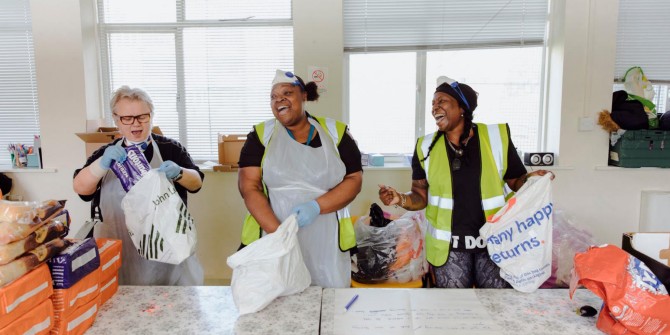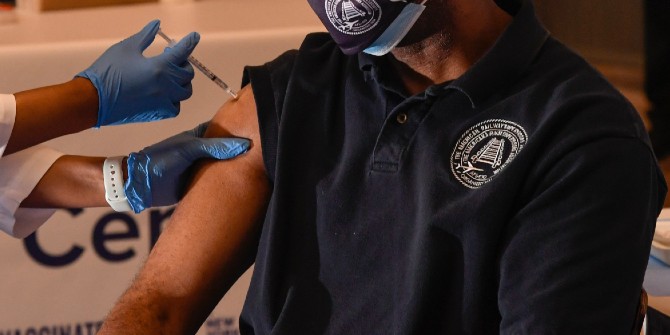The delayed and problematic UK contact-tracing app has become a parable of the government’s failure to deal with the pandemic effectively, says Stephen L Roberts (LSE).
Amid the ongoing COVID-19 pandemic, the UK government’s long-anticipated contact-tracing app has received a great deal of attention. Since the trialing of the app started on the Isle of Wight, the government’s partnership with profit-driven Big Tech corporations to accelerate data collection and analysis throughout the pandemic has attracted criticism. The debate about whether data gathered by contact-tracing apps should be processed via centralised or decentralised platforms has also caused controversy.

Yet despite the government’s claims that the technology will be ‘world-beating‘ and help to exit the lockdown in England, the launch of the app has been stalled. While England’s track and trace system will be launched on 28 May, the government has insisted that the app will be fully effective and in place by 1 June, nearly three months after the WHO first designated COVID-19 a pandemic and after UK deaths from the disease have exceeded 37,000.
Delayed, clouded in controversy and lagging behind in response: in many ways, this ‘world-beating’ contact-tracing app, whether yet in operation or not, has become a parable for the UK government’s failure to respond to the COVID-19 pandemic, and to ensure the health and wellbeing of its citizens. While other countries with significantly lower death tolls and far more effective pandemic response capacities – including Germany, South Korea and Taiwan – were operating transparent and effective contact-tracing systems during peaks in the outbreak, the UK government abandoned plans for a contact-tracing system in March. This was when forecasters estimated that the UK could face over a million cases of COVID-19 and the reproduction rate of the virus, R, was dangerously high in the country.
In stark contrast, Germany initiated testing and contact-tracing of its population in late January when the initial cases of COVID-19 were identified. Similarly, Taiwan enacted transparent and continuous digital approaches to case identification, contact-tracing and resource allocation for public health responses as long ago as Chinese New Year 2020.
Now, however, following the UK government’s dismal track record of a lack of testing, shortages of PPE and medical equipment, and a demonstrable failure to adhere to scientific and medical evidence, the delayed contact-tracing app is being pitched as an indispensable asset in exiting lockdown.
Yet in the race to bring the troubled app into operation, critical assessments of the role and impacts of ‘Big Data-driven’ health surveillance have been left behind. Memories of the Royal Free hospital Google DeepMind scandal are still fresh in the minds of many, and people are acutely and rightly concerned over how data from their smartphones, Bluetooth sentinels and call records might be accessed, processed and stored.
Far from working to engender trust, transparency, and engagement with the public, the UK government’s approach has failed to learn from similar tracing technologies elsewhere. It is still advocating for a centralised data design, whereby contact-matching of potential infected individuals happens on a remote computer server, rather than a decentralised platform, where this process occurs on users’ smartphones and a higher degree of anonymity is ensured.
A recent security analysis has highlighted technical and security issues with the design of the contact-tracing app, recommending it be shifted to the widely-adopted decentralised approach, and how such data could be repurposed or stored after the pandemic subsides.
Nonetheless, the Health Secretary has reiterated that new laws to regulate how data for the UK’s contact tracing-app is used and stored are not needed because the existing Data Protection Act will do the job. Yet again, the government has missed the larger picture. Merely saying that existent data laws are sufficient during a period of national emergency, and failing to account for established public anxieties about surveillance creep does little to engender faith in governance structures or leadership.
As evidence from past epidemics shows, it is not only technology and infrastructure which are critical to controlling outbreaks, but also the willingness of communities and individuals to take up such technologies and to participate in contact-tracing operations to lower infections, especially in scenarios like the UK’s where participation in digital contact-tracing remains voluntary. This government has much to learn about transparent engagement and open communication from other states with far more successful pandemic responses, including Germany and Taiwan.
Because of public concerns about data security and the centralised design of the tracing technology, Northern Ireland has rejected the app in favour of participating in an All-Ireland contact-tracing programme with the Republic of Ireland based on a decentralised system design. Similarly, Scotland has urged caution and has not yet endorsed the app, while it uses established practices of manual contract-tracing. This divergence is part of an increasingly acrimonious dynamic between the UK government and those of Wales, Scotland and Northern Ireland.
You cannot ‘Big Data’ your way out of a pandemic. So much of what has been lost in the pandemic – lost time, lost lives, and financial losses – is due to this and previous government failures to take the pathogenic risks of a globalised world seriously, and to invest, educate, and prepare both health systems and populations for their occurrences.
Clouded in controversy, confusion, division and delay, the contact-tracing app has become deeply symbolic of this government’s mounting failure to respond to the pandemic. The app will be watched closely when it launches. It cannot, however, distract from the wider mishandling and failure of this government to effectively contain the pandemic.
This post represents the views of the author and not those of the COVID-19 blog, nor LSE.






I can agree with your comments and now our civil liberties seem to have been compromised by the installation of the app via our phones. If they aren’t going to use the contact tracing software then how to we get the ‘big brother’ off our phones?
I am concerned about it being used as surveillance in a totalitarian way, especially if cafes, restaurants and pub staff have access to personal details. Staff working in hospitals and schools have a right to personal details but they are police checked. As someone with sensitive gender issues I would feel unsafe about harassment if staff in cafes and pubs have access to my personal details as they have not been trained in the same way as healthcare professionals and without this training the system is open to extreme abuse.